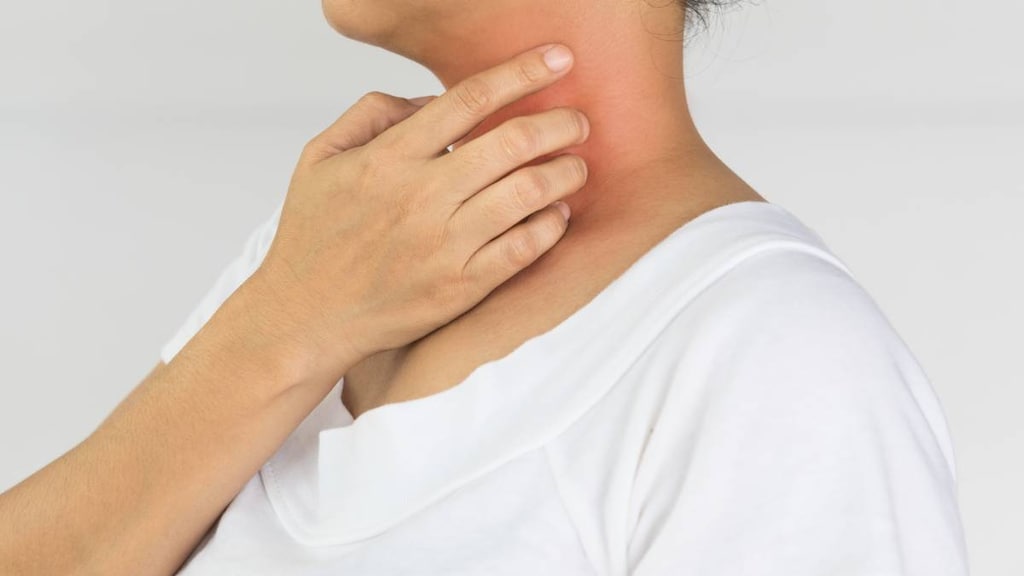Dosage Forms
Excipient information presented when available (limited, particularly for generics); consult specific product labeling. [DSC] = Discontinued product
Cream, External:
Eurax: 10% (60 g [DSC])
Lotion, External:
Crotan: 10% (60 g, 227 g, 454 g) [contains benzyl alcohol, cetyl alcohol, propylene glycol]
Eurax: 10% (60 g [DSC], 454 g [DSC])
Pharmacology
Mechanism of Action
Crotamiton has scabicidal activity against Sarcoptes scabiei; mechanism of action unknown. Antipruritic effects mediated by inhibition of histamine, serotonin, and PAR-2 (Sekine 2012).
Pharmacokinetics/Pharmacodynamics
Absorption
Amount of systemic absorption following topical use has not been determined
Use: Labeled Indications
Treatment of scabies (Sarcoptes scabiei) and symptomatic treatment of pruritus
Contraindications
Hypersensitivity to crotamiton or any component of the formulation; patients who manifest a primary irritation response to topical medications
Dosage and Administration
Dosing: Adult
Pruritus: Topical: Massage into affected areas until medication is completely absorbed; repeat as necessary
Scabies: Topical: Apply a thin layer and massage drug onto skin of the entire body from the neck to the toes (with special attention to skin folds, creases, and interdigital spaces). Repeat application in 24 hours. May re-treat if new lesions appear or itching persists more than 2 to 4 weeks after initial treatment (CDC 2010).
Dosing: Geriatric
Refer to adult dosing.
Dosing: Pediatric
Scabies: Limited data available: Infants, Children, and Adolescents: Topical: Apply a thin layer onto skin of entire body from neck to toes; apply once daily for 3 days followed by a cleansing bath 48 hours after the last application; treatment may be repeated after 7 days if mites appear; not typically first-line therapy as other agents have shown greater efficacy (Hay 2012; Kliegman 2016; Red Book [AAP 2015] ); longer duration of treatment (5 days) has also been reported and was well tolerated (Cubela 1978; Glodust 2014; Konstantinov 1979).
Administration
Topical: For external use only; avoid eyes and mucous membranes. Shake lotion well before using. Take a bath or shower prior to application. Apply from neck down to toes. Trim fingernails and apply under nails (can use toothbrush, which should be disposed of after use). Take a cleansing bath 48 hours after the final application. Contaminated clothing and bed linens should be washed on hot cycle or dry-cleaned and all clothing and bedding should be changed the day after application.
Storage
Store at room temperature.
Drug Interactions
There are no known significant interactions.
Adverse Reactions
Frequency not defined.
Central nervous system: Localized warm feeling
Dermatologic: Contact dermatitis, pruritus, skin rash
Hypersensitivity: Local hypersensitivity reaction
Local: Local irritation
Warnings/Precautions
Other warnings/precautions:
- Appropriate use: For external use only; avoid contact with face, eyes, mucous membranes, and urethral meatus. Do not apply to acutely inflamed, raw, or weeping skin. Discontinue use if severe irritation or sensitization occurs.
Pregnancy
Pregnancy Risk Factor
C
Pregnancy Considerations
Animal reproduction studies have not been conducted; use during pregnancy only if clearly needed.
Patient Education
- Discuss specific use of drug and side effects with patient as it relates to treatment. (HCAHPS: During this hospital stay, were you given any medicine that you had not taken before? Before giving you any new medicine, how often did hospital staff tell you what the medicine was for? How often did hospital staff describe possible side effects in a way you could understand?)
- Have patient report immediately to prescriber severe skin irritation (HCAHPS).
- Educate patient about signs of a significant reaction (eg, wheezing; chest tightness; fever; itching; bad cough; blue skin color; seizures; or swelling of face, lips, tongue, or throat). Note: This is not a comprehensive list of all side effects. Patient should consult prescriber for additional questions.
Intended Use and Disclaimer: Should not be printed and given to patients. This information is intended to serve as a concise initial reference for health care professionals to use when discussing medications with a patient. You must ultimately rely on your own discretion, experience, and judgment in diagnosing, treating, and advising patients.
